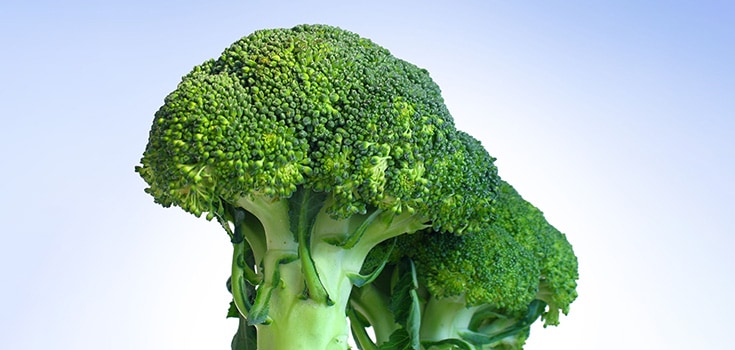Eating Broccoli Reduces Risk of Cardiovascular Disease, Promotes Heart Health

It’s not good enough to know that vegetables like broccoli are healthful; we need to know specifically what sort of benefits they deliver, how they deliver those benefits and how we can make the most of them. One food that offers numerous benefits is broccoli, with some research showing how the vegetable can promote a strong, healthy heart. Given that cardiovascular disease is a top killer of American adults, finding foods that naturally prevent heart problems could be a significant step towards foiling their plan.
A member of the brassica family, broccoli is known as a cruciferous vegetable. And like others in this group (cabbage, Brussels sprouts, and kale), broccoli offers a wealth of health benefits.
Something known as sulforaphane is naturally found in all brassicas, but it is especially concentrated in broccoli. A study performed by researchers with Imperial College London a few years ago found that sulforaphane may be able to actually prevent inflammation in certain “high risk” arterial areas.
According to the researchers, atherosclerosis, or the building up of plaque in the arteries is particular common among bends and branches of our blood’s highways. A naturally protective protein in the body, Nrf2, is inactive in these areas. However, sulforaphane can activate the protein, helping to curb the inflammation and build-up.
“These fascinating findings provide a possible mechanism by which eating vegetables protects against heart disease,” said researcher Peter Weissberg. “As well as adding evidence to support the importance of eating ‘five-a-day’, the biochemistry revealed in this research could lead to more targeted dietary or medical approaches to prevent or lessen disease that leads to heart attacks and strokes.”
Another study, this one from the University of Connecticut, looked at how the inclusion of broccoli in a daily diet could improve heart health. The study used rats—half of which were given a broccoli extract in addition to their normal feed, and the other half who received water as a control.
Related Read: Broccoli Compound Kills Leukemia Cancer Cells
Those who were given broccoli extract had three significant advantages to those who didn’t receive the extract when they underwent heart testing:
- Less heart damage during heart attack-mimicking oxygen deprivation
- Higher levels of heart-protective chemicals during deprivation
- Better blood pumping ability.
The broccoli used in this experiment was lightly steamed. Generally, foods retain their chemical benefits when they are only lightly cooked if cooked at all. In other words, if you are looking to reap heart-healthy benefits from broccoli, eat them raw or only quickly steamed.

I am so confused, I had a heart attack and had a stent put in. they gave me a booklet as to what is good for me and what is not. I was told in the book to avoid broccoli, spinach and eggs. Then I read it is ok. What exactly am I to eat? I was also told I could never use a hot tub again.?,? Can anyone, please. tell me if there is anything that is absolutely safe after heart attack?
Eat IT! My husband had a heart attack and 3 bypasses. If you are on a blood thinner, don't eat a lot at one time. You do have to watch your Vitamin K vegies….eat it about 2x a week. Do your research…the Internet is a wealth of information.
http://nutritiondata.self.com/facts/vegetables-an…
This website is worth it's weight in gold…..the data on each and every vegie is there. You will be sure to find all the information you will need. Explore the world of seeds, nuts, lentils, and juicing.
Broccoli isn’t called the king of the crucifers for nothing. The healing power of “Broccoli” can help: protect against heart disease, fight cancer, and boost immunity. Broccoli is an excellent source of beta-carotene, sulforaphane, and 13C, broccoli contains a variety of other nutrients, each of which can help fend off a host of conditions, from heart disease to osteoporosis. For example—just a half-of-cup cooked broccoli contains 85% of the daily value for vitamin C. This antioxidant vitamin has been proven in studies to help boost immunity and fight diseases like heart disease and cancer. Broccoli is also rich in folate, a nutrient that is essential for normal tissue growth and that studies show may protect against cancer, heart disease, and birth defects. Broccoli is the best vegetable sources of calcium, packing in 72 mg per cooked cup—about a quarter of the amount in an 8 oz. glass of fat-free milk. Calcium is well documented as the single most important nutrient that women need to keep osteoporosis (the breaking of bones) at bay.
Linda — VLCNW Student
Reply to Diana's Question:
First question—are you taking a blood thinner? If you are taking a blood thinner medication the doctor or dietitian may inform you not to eat vitamin K foods which are your green leafy vegetables. Such as—
•Green leafy vegetables, such as kale, spinach, turnip greens, collards, Swiss chard, mustard greens, parsley, romaine, and green leaf lettuce
•Vegetables such as Brussels sprouts, broccoli, cauliflower, and cabbage
•Fish, liver, meat, eggs, and cereals (contain smaller amounts)
Ask your doctor or dietitian or doctor for more information on this subject. I hope this answers your question and helps with the confusion of the booklet the gave you.
Warm Regards,
Linda — VLCNW Student
not only that it is a good source of iron that is actually very good for women especially during pregnancy. But that it is also good for the heart, i really do hope that people with heart problems could be able to read this article.